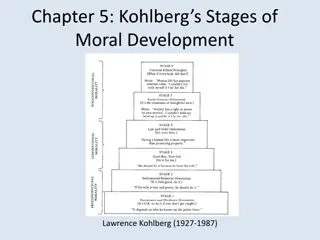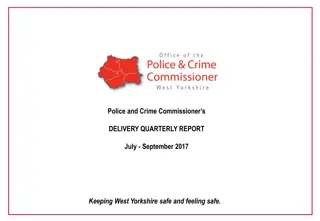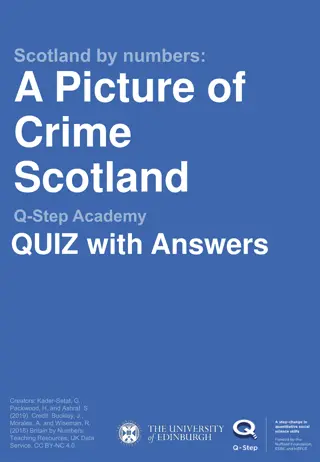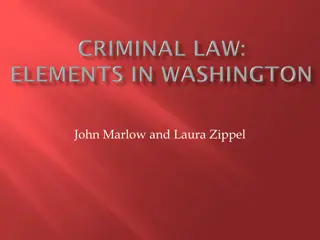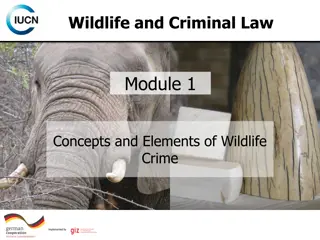
Understanding Crime: Concept, Elements, and Stages
Explore the concept of crime, its definition, fundamental elements, and stages in this insightful guide. Discover how criminal acts are defined by law, the public opinion's role in shaping crime concepts, and the key components of criminal behavior. Gain a comprehensive understanding of crime and its impact on society.
Download Presentation

Please find below an Image/Link to download the presentation.
The content on the website is provided AS IS for your information and personal use only. It may not be sold, licensed, or shared on other websites without obtaining consent from the author. If you encounter any issues during the download, it is possible that the publisher has removed the file from their server.
You are allowed to download the files provided on this website for personal or commercial use, subject to the condition that they are used lawfully. All files are the property of their respective owners.
The content on the website is provided AS IS for your information and personal use only. It may not be sold, licensed, or shared on other websites without obtaining consent from the author.
E N D
Presentation Transcript
Crime: Concept, Elements and Stages
Introduction A crime can be defined as the commission of an act that is prohibited by law, or an omission of an act that is obligated by the law. Crime is considered as social wrong committed by an individual. Criminal law defines the acts which are illegal and prohibited by law. Crime threatens and harms public welfare and safety. Whenever a crime happens intentionally, there is a full-fledged process or stages behind to make it happen. According to Austin, a wrong which is pursued at the discretion of the injured party and his representatives is a civil injury; a wrong which is pursued by the sovereign or his subordinates is a crime.
Concept of Crime The law of crimes as old as the civilisation itself. The crime and the criminal in every society is looked with great hatred, but the study of the crimes and discovering the causes of crimes have remain the greatest attraction among the jurists of the jurisprudence. There always lies necessity of devising some ways and methods to curb such criminal tendencies among the section of the people living in the civilised society. The problem arises as to what acts should be forbidden, or what acts should be selected for punishment by the society or the State. The concept of the crime has been always been dependent on the public opinion. As, H.J. Klare remarked in his book Changing Concepts of Crime and its Treatment that, Law is determined by the political process and accords with what most people recognise as the minimum standards prevailing. The definition of the criminal is also part of the process and the rejection of law by offenders is a form of protest of which they may be dimly aware . Any deviation from the standards of behaviour fixed by the society is punished and such conduct doesn t accord with the prescribed standard which is loosely known as crime.
Definition of Crime Bentham defined Crime as, offences are whatever the legislature has banned/prohibited for good or for bad reasons. If the question relates to a theoretical research for the discovery of the best possible laws according to the principles of utility, we give the name of offence to every act which we think ought to be prohibited by reasons of some evil which it produces or tends to produce. Blackstone in his commentaries on the Law of the England has defined Crime as an act committed or omitted in violation of a Public Law either forbidding or commanding it. Stephen has suggested a modification in the Blackstone s version of definition on Crime and states that, A crime is a violation of a right, considered in reference to the evil tendency of such violation as regards the community at large. Austin posits that, A wrong which is pursued at the discretion of the injured party and his representatives is a civil injury; a wrong which is pursued by the sovereign or his subordinates is a crime.
Fundamental Elements of Crime Human beings Mens rea: Guilty mind Actus reus: Illegal act or omission Injury to another human being
Human being The first element of crime is a human being who- must be under the legal obligation to act in a particular manner and should be a fit subject for awarding appropriate punishment. Section 11 of the Indian Penal Code, 1860(IPC) provides that word person includes a company or association or body of persons whether incorporated or not. The word person includes artificial or juridical persons. Section 2 (27) of the Bhartiya Nyaya Sanhita, 2023 (BNS) Person includes any company or association or body of persons, whether incorporated or not;
Mens Rea The second important essential element of a crime is mens rea or evil intent or guilty mind. Mens Rea is the evil intention of knowledge to do a wrongful act voluntarily in conscious state of mind. It is the guilty mind required for the commission of an offence. Every crime requires a mental element and that is considered as the fundamental principle of criminal liability. The basic requirement of the principle mens rea is that the accused must have been aware of those elements in his act which make the crime with which he is charged. There is a well-known maxim in this regard, i.e., actus non facit reum nisi mens sit rea which means that, the guilty intention and guilty act together constitute a crime. It comes from the maxim that no person can be punished in a proceeding of criminal nature unless it can be showed that he had a guilty mind.
Actus reus The third essential element of a crime is actus reus. In other words, some overt act or illegal omission must take place in pursuance of the guilty intention. Actus reus is the manifestation of mens rea in the external world. Merely possessing a guilty mind and thinking of committing a crime is not enough. The accused person must also act on that intention and do something in its furtherance. Prof. Kenny was the first writer to use the term actus reus .
Injury There can be no crime if no person faces some kind of an injury. According to Section 44 of IPC, injury means any harm caused to a person illegally either in mind, body, reputation or property. However, there can be some crimes which might not require injuries to anybody. For example, driving without a driving license is a crime even if it may not harm anybody.
Stages of crime There are four stages of crime Intention to commit an offence Preparation to commit it Attempt to commit it The commission of the offence
Intention (1st Stage of crime) Intention is the first stage in the commission of an offence and known as mental stage. Intention is the direction of conduct towards the object chosen upon considering the motive which suggests the choice. Law does not take notice of an intention, mere intention to commit an offence not followed by any act, cannot constitute an offence. The obvious reason for not prosecuting the accused at this stage is that it is very difficult for the prosecution to prove the guilty mind of a person.






